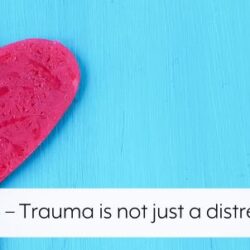
‘Trauma’ in psychological trauma
The word ‘trauma’ carries a range of meanings. In the context of psychology and sexual abuse recovery, it is not simply referring to something very difficult or upsetting. Bessel van der Kolk defines trauma as:
‘an inescapably stressful event that overwhelms people’s existing coping mechanisms’ (van der Kolk & Fisler, 1995).
A definition offered by Karen Saakvitne is:
‘Psychological trauma is the unique individual experience of an event or of enduring conditions in which the individual’s ability to integrate his or her emotional experience is overwhelmed (ie his or her ability to stay present, understand what is happening, integrate the feelings, and make sense of the experience), or the individual experiences (subjectively) a threat to life, bodily integrity, or sanity’ (Pearlman & Saakvitne, 1995, p. 60).
So trauma is an event or series of events that are so overwhelming and threatening to life or sanity that a person cannot cope. The mind may switch off (dissociate) during the event or, at the very least, it will not be able to hold together the different elements of the event afterwards and ‘integrate’ them or join them together. For instance, feelings may be separated off from thoughts, or the cognitive understanding of what is happening may be cut off from the sensory experience. It is this lack of ‘integration’ which characterises trauma. Consequently, the traumatised individual may not be able to think coherently about what happened, or express or connect their feelings about the experience. The traumatic events can be stored ‘separately’ in the mind from normal, everyday experience and in some cases this will result in actual amnesia.
When the mind is overwhelmed by trauma, it finds it hard to store the event(s) as past memory. For a traumatised individual, the event continues to be experienced as ‘present’, as ‘still happening’, because the brain has not been able to integrate the whole experience and mark it with a kind of ‘context stamp’ that says ‘this is over’. It is therefore not surprising that the traumatised person continues to act and feel as if the trauma is still happening, and be over-
The experience of psychological trauma
Many people believe that talking about traumatic events will make things worse. This belief can be part of the ‘avoidance’ of trauma that people unconsciously employ in order to deal with it. But talking about trauma can be helpful if it is done in a way which allows the thinking ‘front brain’ to stay online, and to re-
When trauma is repeated and particularly overwhelming, the only way of dealing with it may be ‘mental flight’. The child distances themselves from what is happening by ‘checking out’ mentally and pretending that the abuse or trauma is happening to someone else. This feeling of ‘depersonalisation’ is also common to adult survivors, who report feeling disconnected from the situation, as if it is a scene from a film, rather than their own experience.
This explains why many survivors struggle to feel that anything bad actually happened to them—they fear that they are making it up. It can be very confusing for other people to see survivors claiming that they suffered terrible trauma but not apparently being upset by it. Trauma survivors in fact are likely to suffer from seemingly unrelated symptoms such as physical illness and pain, depression, or ways of coping such as substance abuse or eating disorders.
But if trauma is understood as ‘disintegrative’, then it is easier to understand these seemingly contradictory responses and connect up the dots between people’s behaviours and difficulties and their abusive past.


